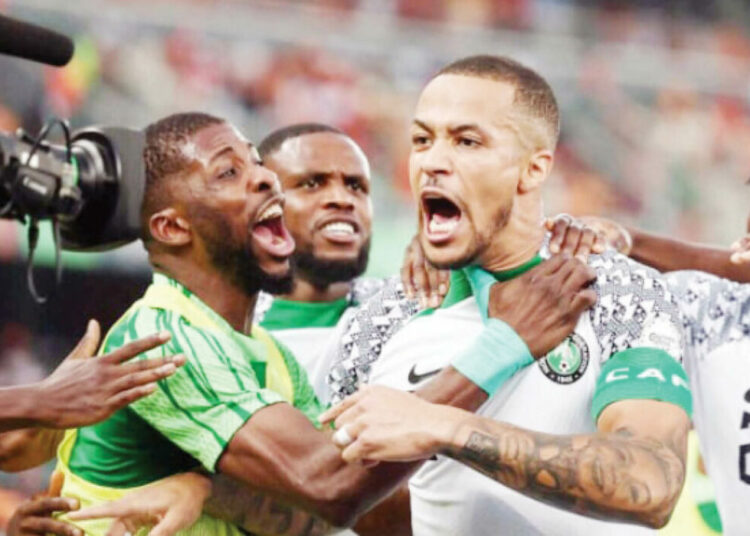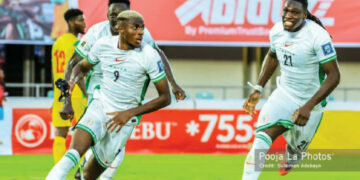As the sun sets over the vibrant landscapes of Morocco, the excitement surrounding Africa’s FIFA World Cup qualifying campaign reaches a fever pitch. This Thursday, four nations—Nigeria, Gabon, Cameroon, and the Democratic Republic of Congo (DRC)—are set to clash in a mini-tournament that could determine their fate for the 2026 World Cup in the United States, Canada, and Mexico. For these teams, the stakes couldn’t be higher as they vie for a coveted spot in next year’s inter-confederation playoffs.
The expanded format of the World Cup, which will feature 48 teams for the first time, presents a unique opportunity for African nations. Historically, the continent has sent five representatives to the tournament, but with the Confederation of African Football (CAF) now granted nine guaranteed places, the dream of World Cup glory feels more attainable than ever. Already, Egypt, Morocco, Algeria, Tunisia, Cape Verde, Senegal, Côte d’Ivoire, Ghana, and South Africa have secured their spots for 2026. However, the introduction of the inter-confederation playoffs means that the fate of four additional teams hinges on this decisive week in Morocco.
The Playoffs: A high-stakes showdown
The playoffs will unfold in the Moroccan capital, Rabat, where Nigeria will face Gabon at the Moulay Hassan Stadium, while Cameroon takes on the DRC at the Al Barid Stadium, today. The winners of these semifinals will advance to the final match on Sunday, where the victor will earn the right to compete in the Inter-continental playoffs March next year. With the format eliminating the safety net of second legs and home advantage, the pressure is monumental. Every mistake could prove fatal, and the short recovery time between matches adds an extra layer of intensity.
For the four participating teams, the playoff stage can be viewed through two distinct lenses. On one hand, Nigeria and Cameroon, both heavyweights in African football, find themselves in a position that many would consider a significant underachievement. On the other hand, Gabon and the DRC, while perhaps less storied in their footballing history, have much to gain from this opportunity.
Nigeria: A legacy in peril
Nigeria’s Super Eagles have long enjoyed a reputation as one of Africa’s footballing giants. However, their journey to the playoffs has been fraught with challenges. Finishing second in Group C, behind fierce rivals South Africa, is a bitter pill to swallow for a team that boasts immense talent. The Super Eagles’ campaign started poorly, with just three points from their first four matches, but they managed to recover somewhat, only to finish one point adrift of South Africa.
The disappointment of missing out on the top spot is compounded by internal strife. Players have reportedly staged training boycotts on Tuesday due to unpaid wages, adding to the already tense atmosphere surrounding the squad. For Nigeria, the playoffs represent a chance for redemption, a pathway to the World Cup that they cannot afford to squander.
Cameroon: A tumultuous road
Similarly, Cameroon, the Indomitable Lions, find themselves in a precarious situation. With a storied history of World Cup qualification, including eight appearances—more than any other African team—Cameroon’s failure to emerge as group winners is a major setback. Finishing four points behind Cape Verde, who secured their first-ever World Cup qualification, has raised eyebrows and sparked criticism among fans and pundits alike.
The internal chaos surrounding the team has not helped their cause. The recent feud between the FA president and head coach Marc Brys has created an environment of instability, with the squad list being published just days before the playoffs. Rumours suggest that Brys may have already resigned himself to failure, casting a shadow over the team’s preparations. For the Indomitable Lions, the playoff represents a crucial opportunity to restore their legacy and re-establish themselves as a force in African football.
Gabon and the DRC: Underdogs with a chance
Conversely, for Gabon and the DRC, qualification for the playoffs is a remarkable achievement in itself. Gabon, often overshadowed by more successful neighbours, has never qualified for a World Cup. Their performance during the qualifiers has been commendable, with only five points dropped throughout their campaign. The attacking prowess of stars like Denis Bouanga and Pierre-Emerick Aubameyang provides them with hope as they aim to make history.
The DRC, too, has a rich footballing heritage, with the iconic Zaire side of 1974 still etched in the memories of fans. Under the guidance of coach Sébastien Desabre, the Leopards have rekindled their competitive spirit, pushing Senegal and the Côte d’Ivoire to the limit in their qualifying groups. Their recent form suggests that they could be a formidable opponent in the playoffs, driven by the desire to seize a rare opportunity to qualify for the World Cup.
The road to Morocco
As the teams prepare for the playoffs, the narratives surrounding each squad add layers of intrigue to the tournament. For Nigeria and Cameroon, the burden of expectation weighs heavily. Fans and analysts alike are eager to see if these traditional powerhouses can rise to the occasion and deliver performances worthy of their illustrious histories. Conversely, Gabon and the DRC have the chance to defy the odds and create their own legacies, making for an electrifying atmosphere in Morocco.
The stakes are high, and the potential for drama is palpable. Each match will be a test of skill, resilience, and mental fortitude. The absence of second legs means that teams cannot afford to hold back; they must bring their best from the first whistle to the last. Tactical discipline, squad depth, and momentum will be critical factors in determining which teams advance to the final and ultimately secure their place in the World Cup playoffs.
Tactical considerations
As teams prepare for the matches, tactical considerations will play a crucial role. Nigeria’s Super Eagles, known for their speed and attacking flair, will need to find a way to overcome Gabon’s defensive organisation. The Eagles’ midfield must control the tempo of the game, while their forwards will seek to exploit any defensive lapses from the Gabonese side.
Conversely, Gabon will rely on their star players, Bouanga and Aubameyang, to create goal-scoring opportunities. If they can break through Nigeria’s defensive line, they may just pull off a shocking upset. The DRC, facing Cameroon, will need to build on their recent successes and utilise their attacking prowess to unsettle the Indomitable Lions.
For Cameroon, the challenge lies in overcoming their internal turmoil. If the squad can rally together and put aside their differences, they have the talent to make a deep run in the playoffs. However, if the off-field issues continue to disrupt their preparations, they may struggle against a determined DRC side eager to capitalise on any weakness.
The global stage awaits
As the playoffs approach, the excitement is building not just in Morocco but across Africa and beyond. The potential for greater representation at the World Cup has ignited the hopes and dreams of millions. For fans, players, and football associations alike, this week is about more than just qualification; it’s about pride, legacy, and the chance to write a new chapter in African football history.
With the world watching, the teams will take to the pitch, knowing that every moment could be pivotal. In a tournament format that leaves no room for error, the pressure will be immense. The roar of the crowd, the passion of the players, and the weight of expectations will all collide in a thrilling spectacle that promises to captivate audiences far and wide.
For Nigeria, Cameroon, Gabon, and the DRC, this is the moment they have been working towards—a chance to turn their dreams into reality and to showcase African football on the grandest stage of all. The journey to the World Cup is fraught with challenges, but for these four teams, the opportunity to shine has never been more within reach.





